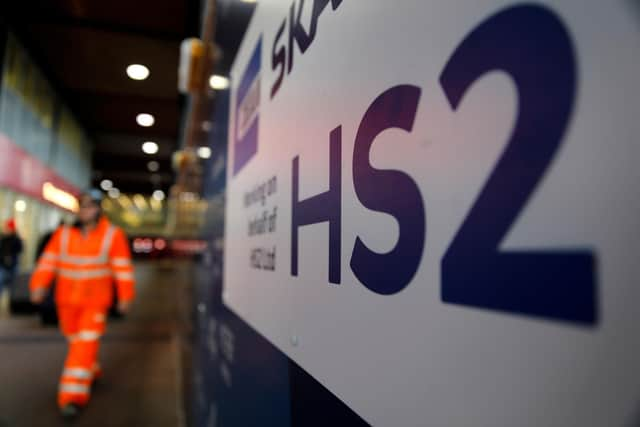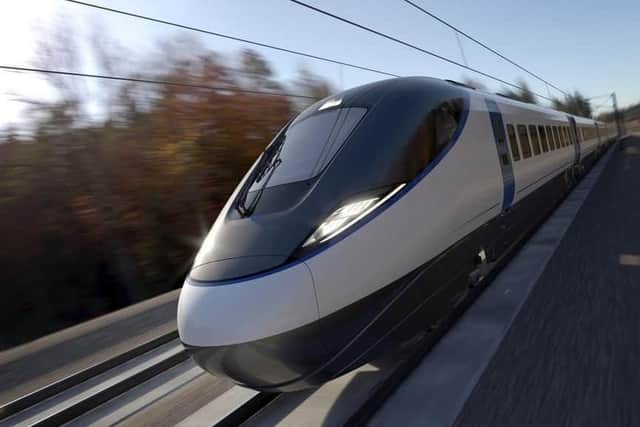HS2: Delays to high speed rail are undermining work to cut Scotland's carbon emissions, new report says
Delays to HS2, the new high speed rail link between London and the north of England, is undermining work to hit carbon emissions targets in Scotland, a new report has claimed.
The report says failures to bring down rail journey times mean more and more Scots are relying on flying to get to and from London.
Advertisement
Hide AdAdvertisement
Hide AdThe document adds a high speed electrified rail network is “vital” to helping Scotland meet its ambitious climate change targets, and says more “imagination” is needed to transform public transport if these targets are to be met.


HS2 aims to link cities in the north of England like Birmingham and Manchester with London by high speed rail, bringing shorter journey times and more capacity for both passenger and freight services.
Once completed, journeys between London and Glasgow are estimated to only take around three hours and 40 minutes – compared to the four hours and 30 minutes it currently takes.
However, since it was first proposed back in 2009, the project has faced a number of challenges and setbacks and calls for HS2 to be extended further north into Scotland have been rejected.
As a result the high speed trains travelling on the new HS2 route will have to continue on from the north of England to Scotland using the regular east coast mainline to Edinburgh or the existing west coast mainline to Glasgow.


On the back of this, in 2012 Nicola Sturgeon, who at the time was serving as infrastructure secretary, vowed she would not wait for Westminster to bring high speed rail to Scotland, promising a line would be built north of the border by 2024.
All of these setbacks mean the first stage of HS2 is not due to open to the public until 2033 – another decade away.
Now the Scottish Inter-City Rail Taskforce, a project set up by the High Speed Rail Group, says failure to bring journey times down is harming the environment and Scotland’s efforts to tackle the climate emergency.
Advertisement
Hide AdAdvertisement
Hide AdThis is because long journey times by rail are forcing people to fly between Scotland and London, creating the busiest short haul air corridor in the whole of Europe.
The report suggests the carbon emissions per passenger of an electric train between Glasgow and London is just 4.9kg – a fifth lower than analysis carried out by the UK Department for Transport.
However the group adds 43.2kg is emitted by a car making the same journey, and a whopping 304kg by a flight going between the two cities.
This means a flight potentially emits up to 60 times more carbon per passenger than a comparable rail journey.
The lack of high speed rail also means freight is being shifted away from the railways and onto high polluting lorries on the roads instead.
The report from the taskforce says tackling this will be the “single biggest opportunity across Europe” to make a large-scale carbon reduction without negatively impacting on the economy or incentives to taking public transport.
The document said: “Across Europe, airlines and rail operators are collaborating to shift long-distance domestic travel from air to rail, delivering significant carbon savings and freeing up airlines to focus on the international routes for which they are best suited.
“The same energy and imagination is required in the UK, with an approach that puts in place all the necessary levers, including fixing the fares and taxation regime alongside infrastructure investment to incentivise rail travel.”
Advertisement
Hide AdAdvertisement
Hide AdLess energy is needed to move a tonne per kilometre by rail, partly because higher loads can be carried and because rolling resistance is lower.
Rail carbon emissions account for just 1.2 per cent of all transport emissions in Scotland.
The taskforce’s report also warns the lack of an overall economic masterplan for HS2 is limiting wider economic opportunities in Scotland, and is pushing back the development of further high speed rail lines to beyond 2050.
The report added: “Developing the long-term investment programme needed requires new forms of collaboration.
“This is particularly true of Anglo-Scottish journeys, where the size of the decarbonisation prizes are biggest, and where investment decisions north and south of the border are co-dependent.”
The group says the impact the delays to HS2 are having on both Scotland’s climate change targets and its wider economy means a new approach to rail travel needs to be considered by the UK Government.
The body added: “Taken together, this amounts to a significant setback to achieving transport sector decarbonisation nationally – the impact of HS2 on Anglo-Scottish journeys will be blunted, and with it, the potential to encourage modal shift and significantly reduce CO2 emissions will be diminished.”
The report has been released just days after it was confirmed the chief executive of the HS2 railway had resigned amid severe delays and soaring costs that have seen the project scaled back.
Advertisement
Hide AdAdvertisement
Hide AdMark Thurston will be departing the government-owned company at the end of September. His decision was confirmed with the first phase of the project between London and Birmingham at peak construction.
A spokeswoman for the UK Department for Transport said: “We’re committed to helping the UK reach net zero by 2050, which is why we’re building HS2, investing in cleaner freight, and have one of the world’s most comprehensive sustainable aviation fuel programmes.
“Delivering of HS2 is well underway with 350 active construction sites, and its opening stage will be delivered to schedule by 2033.”
The Scottish Government was approached for comment. HS2 Ltd declined to comment on the report.
Comments
Want to join the conversation? Please or to comment on this article.